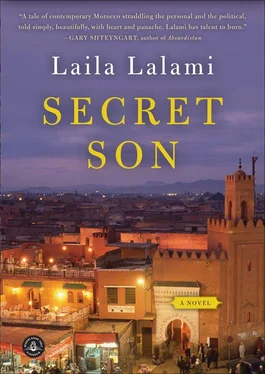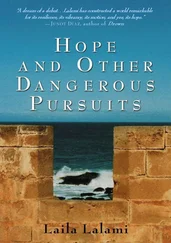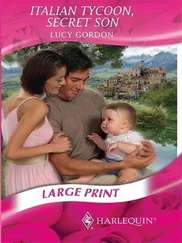Over and over, she had told Youssef to stay away from Maati and Amin, from the Party, from that cursed Oasis. If the police were monitoring Hatim, then something terrible was brewing, and there was no telling what would happen. She quickened her pace, eager to get home and tell Youssef.
She found him lying despondently on the divan. For the past few days, he had been like this — quiet, pensive, lost in a world she could not enter. “Youssef,” she whispered. He turned to look at her, and her expression must have betrayed her because he sat up immediately. “What’s wrong?” he asked.
She pointed to the bedroom. They went inside. She told him what she had heard, her right hand over her chest as if to still the beating of her heart.
“You’re sure it was Maati?” Youssef asked.
“Of course I’m sure it was him, my son. I’ve known him since he was ten years old.”
Still, he looked incredulous, unable to accept the idea that one of his closest friends was an informant. He paced in front of her, his fingers touching his temples, as if he could not contain all the thoughts that raced around inside his head. Then he made her repeat, word for word, the conversation she had heard. “But isn’t it strange,” Youssef said when she was finished, “that they spoke of such things openly, even though you were right there? Are you sure they weren’t just pulling a prank?”
His tone suggested absurd hope, and so Rachida realized that the only way to convince her son was to tell him the truth. She would never be able to save Youssef from Hatim and his people if she did not, at long last, tell the truth. “They spoke in Tamazight.”
“You understand Tamazight?”
She nodded. Tamazight belonged to a time when she still had a family, she began.
“A family?” Youssef asked. His face grew pale, and he sat on his bed and watched her with disbelief, his pupils dilated in the half-light of the bedroom. He seemed to her again like a child, no longer a grown man but just a child, and she wanted to wrap her arms around him and run her fingers through his hair and tell him that everything would be all right in the end. But there was no getting away from the truth this time. She told him first about her mother, Izza, whose face she could no longer recall after so many years. Rachida did remember, though, the shape of Izza’s body as she came through the doorway of their house, backlit by the bright mountain sun. She remembered the feel of Izza’s hands as she brushed and plaited Rachida’s four-year-old hair. She remembered the weight of the stones when they played marbles together. She remembered the smell of lavender on Izza’s bed, even at the very end, when she was too sick to leave it.
A few months after Izza died, Rachida’s father, Hammou, had sent Rachida to the orphanage in Fès, where she could attend school. It would be good for her, he said, better than climbing trees and running around in the fields, picking daisies. In all her time at the Bab Ziyyat orphanage, Rachida’s father had visited just three times, and when he did, it was to marvel at how much she had grown and how well she could read. “He gave me up to the orphanage and told me it was for my own good.”
Rachida was in her first year of training to be a midwife when the head nun told her she would be working for Fatema Amrani, who needed someone to attend to a pregnant woman on bed rest. Rachida had taken care of Fatema’s daughter-in-law Malika Amrani, carefully noting her weight, temperature, and blood pressure in a notebook, and spent the rest of her time on the veranda, working on her embroidery or reading a magazine.
This was how she had met Nabil Amrani, who always spoke with passion, whether it was about music or movies or, especially, politics. His eyes sparkled with curiosity whenever he looked at her. He smiled at her every time she passed him in a corridor, brushed against her when she brought a tray for his wife, asked whether it was true the nuns at the orphanage had chartered a bus to go see Nana Mouskouri in concert in Casablanca.
His wife had never suspected anything, but his mother, Madame Fatema Amrani, had found out and had thrown Rachida out of the house. She had not even given her time to pack her suitcase. Nabil had entered her life and changed it for the worse, but also for the better, for had he not given her Youssef?
Rachida had to start over in a new place. She was no longer Rachida bent Hammou ben Abdeslam ben Abdelkader Ouchak. She was merely Rachida Ouchak, a widow and mother, living in the city, away from the mountains of her childhood, away from the orphanage of her adolescence, away from the mansion of her youth.
The relief of sharing a story she had waited so long to tell was intoxicating. She could not stop, now that she had begun. Her father came from a long line of horsemen. He owned land and was respected in all the villages in the area. To go back to him pregnant would mean the end of him. So she stayed away from him and took her baby to Casablanca, where everyone could start over.
As she spoke, she watched Youssef’s face for hints of his reaction. Would he believe her, or would he, once again, look at her with his heartbreaking skepticism? There was a time in his life when she could read the emotions on his face. Once, when he was eight years old, he had come home, his right hand bleeding, saying that he fell on a rock. She inspected his hand; he had a deep cut, in the shape of a paperclip, and she immediately set about disinfecting it. As she worked, she noticed the way his lips quivered when she pressed him for details, and she knew he was lying. “I told you not to play with the neighbor’s bicycle,” she said sharply. “You fell on the handle, didn’t you?” His eyes widened in terror and he confessed on the spot.
But all that was long ago. He had changed so much in the past three years that she could not claim to know what went on inside his head. She expected he would be angry with her, and she would not blame him if he were. What she feared, though, was that he would accuse her of hiding something — she had lied to him so often in the past — and that he would ignore her pleas to stay away from Maati and from the café. She needed him to believe her. She took a deep breath, and when she released it, she spoke in the language of her childhood, in Tamazight, the words rolling on her tongue like a declaration of love. “Hati lmaaqul aktinigh, aywi, amni.”
At the sound of this new language inside their home, the lines on Youssef’s forehead disappeared. His jaw relaxed. He spoke in a whisper. “It is true, then,” he said.
“It is,” she said, and put her hand on his. “Now do you believe me?”
“Yes.”
“Will you stay away from Maati?”
“Yes.”
All of a sudden, her knees felt weak and she sat down on her bed, across the room from Youssef. It seemed that he was listening to her this time, not just hearing her words and reluctantly speaking his own. But then he lay on his bed and stared at the ceiling, lost in his thoughts.

Youssef had wanted nothing more than the truth; all his quarrels with his mother had been because of it. Now she had delivered it, and as it sank in, he began to see what it might mean. He was an Ouchak from Sefrou on his mother’s side, and an Amrani from Fès on his father’s side. He was half-Berber and half-Arab; he was a man of the mountains, and a man of the city; a man of the people and an aristocrat; a full-blooded Moroccan, with the culture and the history of a thousand years — a rich identity, of which he could be proud.
But this truth was as invisible as air, as fleeting as breath itself. The real truth was what everyone around him saw: he was a slum dweller, the son of a hospital clerk, a man with no illusions about his place in society. Youssef had yearned for a father, and the yearning had led him on a journey to find him. His father had deserted him. His friend Amin had betrayed him. His friend Maati had spied on him. What was left? Who was left?
Читать дальше













